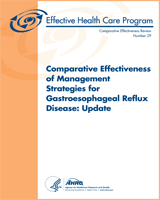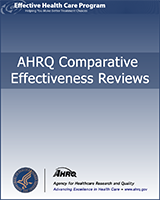NCBI Bookshelf. A service of the National Library of Medicine, National Institutes of Health.
This publication is provided for historical reference only and the information may be out of date.
Excerpt
This report examines alternatives for managing the chronic symptoms of uncomplicated gastroesophageal reflux disease (GERD) in patients who may require long-term treatment. It summarizes the available evidence comparing the efficacy and safety of medical, surgical, and endoscopic interventions in the treatment of chronic GERD, particularly after long-term followup. Questions addressed in this report are: 1) What is the evidence of the comparative effectiveness of medical, surgical, and endoscopic treatments for improving objective and subjective outcomes in patients with chronic GERD? 2) Is there evidence that effectiveness of medical, surgical, and endoscopic treatments varies for specific patient subgroups? 3) What are the short- and long-term adverse effects associated with specific medical, surgical, and endoscopic therapies for GERD?
Contents
- Preface
- Acknowledgments
- Executive Summary
- 1. Introduction
- 2. Methods
- 3. Results
- Key Question 1A. What is the evidence of the comparative effectiveness of medical, surgical, and endoscopic treatments in improving objective and subjective outcomes in patients with chronic GERD?
- Comparative effectiveness of surgical treatments (, ) and long-term effectiveness of surgical treatments (, , )
- Key Question 1B. In patients with Barrett's esophagus, what is the result of medical versus surgical management in terms of the incidence of adenocarcinoma of the esophagus?
- Key Question 2A. What are the characteristics of patients who have undergone these therapies, including the nature of previous medical therapy, severity of symptoms, age, sex, weight, other demographic and medical factors or by specific patient subgroups, and provider characteristics for procedures including provider volume and setting (eg, academic versus community)?
- Key Question 2B. Is there evidence that effectiveness of medication, surgical and endoscopic therapies vary for specific patient subgroups?
- Key Question 3. What are the short- and long-term adverse effects associated with specific medical, surgical and endoscopic therapies for GERD? Does the incidence of adverse effects vary with duration of follow-up, specific surgical intervention, or patient characteristics?
- 4. Summary and Discussion
- 5. Future Research
- Appendixes
- Appendix A Search strategy
- Appendix B List of Excluded Studies
- Appendix C Evidence Tables
- Appendix D Peer Reviewers
- Appendix E Common Esophagitis Grading Scales
- Appendix F Description of Endoscopic Treatments and Preliminary Findings
- Appendix G Gastroesophageal Reflux Disease-Health-Related Quality-of-Life Scale
- References
Prepared for: Agency for Healthcare Research and Quality, U.S. Department of Health and Human Services.1 Contract No. 290-02-0022. Prepared by: Tufts-New England Medical Center EPC, Boston, Massachusetts.
Suggested citation:
Ip S, Bonis P, Tatsioni A, Raman G, Chew P, Kupelnick B, Fu L, DeVine D, Lau J. Comparative Effectiveness of Management Strategies for Gastroesophageal Reflux Disease. Comparative Effectiveness Review No. 1. (Prepared by Tufts-New England Medical Center Evidence-based Practice Center under Contract No. 290-02-0022.) Rockville, MD: Agency for Healthcare Research and Quality. December 2005. Available at: http://effectivehealthcare.ahrq.gov/healthInfo.cfm?infotype=all&reptype=allfinal.
This report is based on research conducted by the Tufts-New England Medical Center Evidence-based Practice Center (EPC) under contract to the Agency for Healthcare Research and Quality (AHRQ), Rockville, MD (Contract No. 290-02-0022). The findings and conclusions in this document are those of the authors, who are responsible for its contents; the findings and conclusions do not necessarily represent the views of AHRQ. Therefore, no statement in this report should be construed as an official position of AHRQ or of the U.S. Department of Health and Human Services.
The information in this report is intended to help health care decisionmakers, patients and clinicians, health system leaders, and policymakers make well-informed decisions and thereby improve the quality of health care services. This report is not intended to be a substitute for the application of clinical judgment. Anyone who makes decisions concerning the provision of clinical care should consider this report as they would any medical reference and in conjunction with all other pertinent information, i.e., in the context of available resources and circumstances presented by individual patients.
This report may be used, in whole or in part, as the basis for development of clinical practice guidelines and other quality enhancement tools, or as a basis for reimbursement and coverage policies. Neither AHRQ's nor the U.S. Department of Health and Human Services' endorsement of such derivative products may be stated or implied.
- 1
540 Gaither Road, Rockville, MD 20850. www
.ahrq.gov
- Review Lower esophageal sphincter injections for the treatment of gastroesophageal reflux disease.[Thorac Surg Clin. 2005]Review Lower esophageal sphincter injections for the treatment of gastroesophageal reflux disease.Watson TJ, Peters JH. Thorac Surg Clin. 2005 Aug; 15(3):405-15.
- Review Comparative Effectiveness of Management Strategies for Gastroesophageal Reflux Disease: Update[ 2011]Review Comparative Effectiveness of Management Strategies for Gastroesophageal Reflux Disease: UpdateIp S, Chung M, Moorthy D, Yu WW, Lee J, Chan JA, Bonis PA, Lau J. 2011 Sep
- [Gastroesophageal reflux: alternatives to medical treatment].[Rev Med Brux. 2008][Gastroesophageal reflux: alternatives to medical treatment].Devière J. Rev Med Brux. 2008 Sep; 29(4):373-8.
- Review Dyspepsia and Gastro-oesophageal Reflux: A Systematic Review[ 2007]Review Dyspepsia and Gastro-oesophageal Reflux: A Systematic ReviewSwedish Council on Health Technology Assessment. 2007 Oct
- Review Endoscopic therapy for gastroesophageal reflux disease.[Minerva Gastroenterol Dietol. ...]Review Endoscopic therapy for gastroesophageal reflux disease.Louis H, Devière J. Minerva Gastroenterol Dietol. 2005 Dec; 51(4):303-12.
- Comparative Effectiveness of Management Strategies For Gastroesophageal Reflux D...Comparative Effectiveness of Management Strategies For Gastroesophageal Reflux Disease
Your browsing activity is empty.
Activity recording is turned off.
See more...

